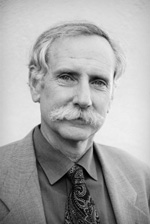 Walter Willett, M.D., Dr. P.H., a nutrition expert frequently cited internationally for his expertise on foods, fats and diets, will be the guest speaker at the 2005 Denham Harman, M.D., Ph.D. Lectureship in Biomedical Gerontology.
Walter Willett, M.D., Dr. P.H., a nutrition expert frequently cited internationally for his expertise on foods, fats and diets, will be the guest speaker at the 2005 Denham Harman, M.D., Ph.D. Lectureship in Biomedical Gerontology.
Dr. Willett, professor of epidemiology and nutrition and chairman of the Department of Nutrition at Harvard School of Public Health, will present “The Metabolic Syndrome as a Major Partner in Aging: The Mitigating Role of Lifestyle” on Friday, April 15, at noon in the Durham Research Center Auditorium.
Dr. Willett has published more than 900 articles, primarily addressing lifestyle risk factors for heart disease and cancer, and is known for his criticism of the United States Department of Agriculture Food Guide Pyramid, a general outline of daily diet recommendations. Based on years of research, Dr. Willet created his own food pyramid.
Dr. Willet says Americans may live longer by following certain diet and exercise habits.
Based on most desirable, Dr. Willett’s pyramid emphasizes whole grain foods, plant oils, vegetables, fruit, fish, poultry and eggs, whereas the USDA pyramid ranks most desirable breads, cereal, rice and pasta, vegetable and fruits and meat, poultry, fish, eggs and calcium products. Dr. Willett said red meat, butter, potatoes, white rice and white bread should be used sparingly.
Dr. Willet claims the USDA pyramid is flawed with its statement that all fats are bad, all complex carbohydrates are good, all protein sources offer the same nutrition; and dairy should be eaten in high amounts.
Dr. Willett has focused much of his work over the past 25 years on the development of methods, using both questionnaire and biochemical approaches, to study the effects of diet on the occurrence of major diseases. He has applied these methods starting in 1980 in the Nurses’ Health Studies I and II and the Health Professionals’ Follow-up Study. The dietary assessment of nearly 300,000 men and women is providing detailed information on the long-term health consequences of food choices.
In 2001, he wrote his most recent book for the public, Eat, Drink and Be Healthy, after 20 years of research. The book has appeared on most major bestseller lists.
Dr. Willett and his team’s research primarily involve studying dietary factors in the cause and prevention of cardiovascular disease, cancer, and other important conditions. The team found a positive association between alcohol consumption and breast cancer but no relation with fat intake, a positive association between animal fat and red meat consumption and risk of colon cancer, and strong inverse associations between vitamin E consumption and risk of coronary heart disease in men and women.
The team also has found a positive association between partially hydrogenated vegetable fats and coronary heart disease incidence, and inverse association between intake of calcium and kidney stones. Other endpoints being examined in the study with regard to diet include diabetes, cataracts, glaucoma, gallstones, and other malignancies.
Dr. Willett follows his own advice. In a typical day, his diet includes cooked whole grains with fruit, salad, nuts, vegetables with tofu, chicken or fish.
Dr. Willett, also a professor of medicine at Harvard Medical School, studied food science at Michigan State University and graduated from the University of Michigan Medical School before obtaining a Doctorate in Public Health from Harvard School of Public Health. He is a member of the Institute of Medicine of the National Academy of Sciences and the recipient of many national and international awards for his research.
The Denham Harman, M.D., Ph.D. Lectureship in Biomedical Gerontology was established by the University of Nebraska Foundation in honor the scientific achievements of Dr. Harman, UNMC emeritus professor of internal medicine, known internationally as the father of the free radical theory of aging, who also discovered the role of antioxidants (vitamins C, E and beta-carotene), in fighting heart disease and cancer.
Dr. Harman’s research on aging is based on the theory he proposed in 1954 – that free radicals, highly reactive molecules freed in the normal chemical processes of living, cause aging and disease through their destructive actions in cells and tissues. At first, his theory was ridiculed and dismissed by many in the scientific community. It gained acceptance in the 1980s and now is considered a theory of aging.
His work at UNMC also established the role of antioxidants in fighting cancer and heart disease. His research has led to international recognition and awards.